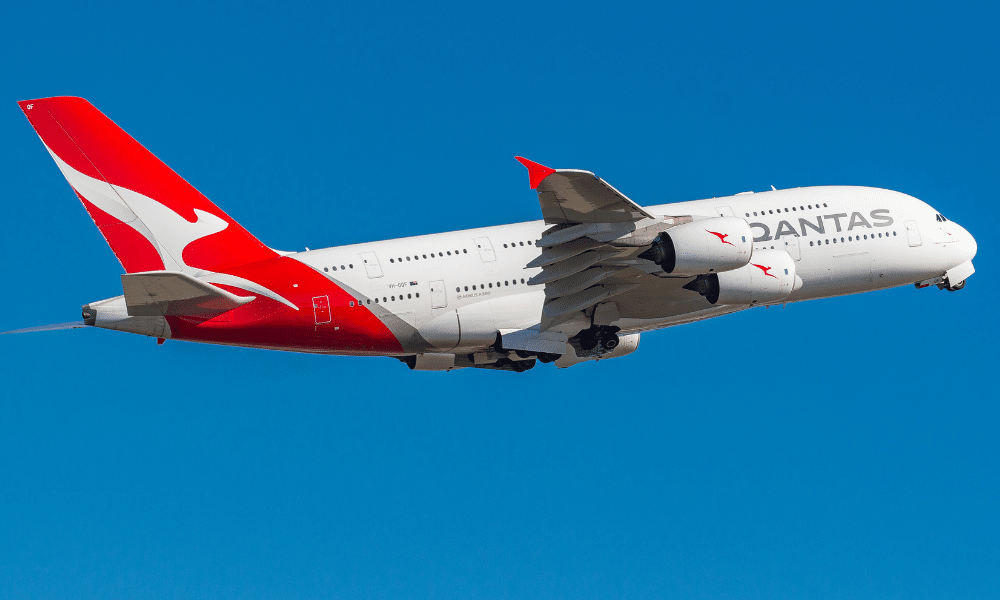If you walk instead of drive or install solar panels, Qantas will reward you.
Qantas is the first airline in the world to reward frequent flyers for being sustainable in the air and on the ground. The Australian national airline is adding a new tier to its loyalty program for frequent flyers. The new “Green Tier” is designed to educate, encourage and reward the airline’s 13 million frequent flyers for making sustainable choices – everything from offsetting their flights or staying in eco-hotels, walking to work and installing solar panels at home. This initiative is in addition to the national carrier’s progress towards net zero emissions by 2050.

The Green Tier, set to be rolled out early next year, was driven by feedback from frequent flyers, with research showing almost two-thirds want to be more aware of their impact on the environment and would like support in their efforts to be more sustainable.
To achieve the new Green Tier status, members must complete at least five sustainable activities across six areas – flying, travel, lifestyle, sustainable purchases, reducing impact and giving back – each year. Members will be rewarded with benefits such as bonus Qantas Points or status credits. These bonuses will be in addition to any rewards they may earn through their current flying status or as part of Points Club.
While the program will not officially start until early next year, frequent flyers can start working towards their sustainability target through a select number of sustainable activities now. These include offsetting their flights, home and car, installing solar panels or making a contribution towards protecting the Great Barrier Reef.
For example, members can now earn 10 Qantas Points per $1 spent when they offset their home or car via the Frequent Flyer website. The average annual cost to offset home energy for a family of four with two cars would be approximately $200 or 26,000 Qantas Points.
This initiative complements Qantas’ existing Fly Carbon Neutral, with 11 per cent of customers on qantas.com offsetting their carbon emissions which Qantas matches dollar for dollar.

Sustainability a “Core Part” of Qantas Group’s National Approach
Alan Joyce, the CEO of Qantas Group, said that sustainability would become a core part of the Frequent Flyer program and the carrier’s overall approach.
“Our customers are concerned about climate change and so are we. There’s a lot of action we’re taking as an airline to reduce our emissions and that means we have the framework to help our customers offset and take other steps to reduce their own footprint.
“This new Green tier is a way of encouraging and recognising those who want to do their part by offering Qantas Points or status credits, which we know helps shape customer choices.
“Offsetting is one of the main ways Australia can reduce its net emissions in the short to medium term until new low emission technology becomes available.
“As an airline, we’re looking at structural changes to reduce our greenhouse gases, including investment in more efficient aircraft that can cut emissions by 15 per cent and using sustainable aviation fuel that typically cuts it by up to 80 per cent.
“In Europe and the United States, there’s a growing sustainable aviation fuel sector that proves the potential for Australia to create one of its own. We’re having conversations with the rest of the industry and governments on how we kickstart that. In the meantime, we are finalising our first significant purchase of sustainable aviation fuel.”
Greenwashing? The Problem With Carbon Offset Programs
Not everyone is convinced that Qantas is sincere in its efforts to fight climate change – after all, the airline still wants to fly its planes (irrefutably polluting our planet).
You may have heard the term “greenwashing” thrown about in recent months, particularly following Greta Thunberg’s speech at COP26 in Glasgow. Greenwashing essentially refers to a common marketing ploy in which a company or organisation tries to make itself look more environmentally friendly than it really is.
While Qantas has a number of strategies to achieve its net zero target, one of the four pillars to support that target is carbon offsets.
One issue with carbon offset programs, in particular, is that they can be used as a way of deflecting responsibility from companies and individuals who are not doing enough to reduce their own emissions. In other words, if you’re worried about your climate impact, you can simply “pay the guilt away” without doing anything on a deeper level to change your behaviour.
In this sense, offset schemes can be seen as a bit of a cop-out. When carbon offsets were first offered by airlines in 2006, George Monbiot (The Guardian) wrote what could be a direct response to Joyce’s statement about offsets being a short term solution.
“Any scheme that persuades us we can carry on polluting delays the point at which we grasp the nettle of climate change and accept that our lives have to change. But we cannot afford to delay. The big cuts have to be made now, and the longer we leave it, the harder it will be to prevent runaway climate change from taking place. By selling us a clean conscience, the offset companies are undermining the necessary political battle to tackle climate change at home. They are telling us we don’t need to be citizens; we need only to be better consumers.”
Monboit also pointed out the second problem with traditional offset schemes – that trees take time to grow. He notes: “Almost all the carbon offset schemes take time to recoup the emissions we release today.”
He concluded with this grim warning; “You can now buy complacency, political apathy and self-satisfaction. But you cannot buy the survival of the planet.”
Qantas, in their defense, is going beyond their offset program to encourage customers to actively choose sustainable options, but the jury is out on whether this will have a significant impact on emissions or is simply a token gesture that will be quickly forgotten.
Our professional solar installers in Melbourne will assess and determine your energy needs. We customise a solar panel system in Melbourne to fit the roof size of your property, ensuring you receive the most suitable solar panel system for your Melbourne home, meeting to property’s energy requirements.











































